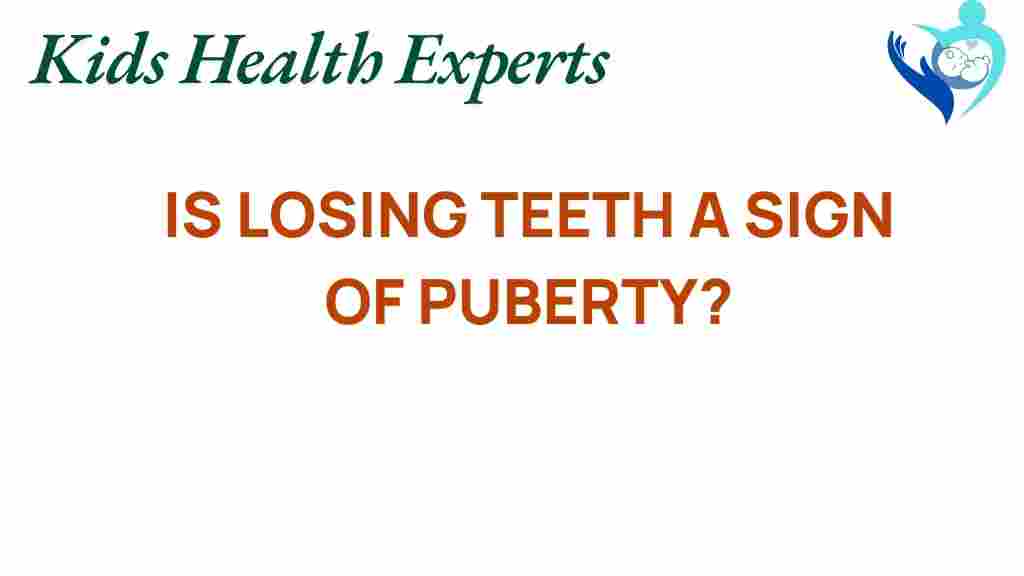Losing Teeth: A Sign of Puberty or Childhood Development?
The transition from childhood to adolescence is marked by numerous changes, both physically and emotionally. One of the most noticeable changes during this time is losing teeth. Many parents and caregivers often wonder if this process is simply a part of normal development or if it signifies the onset of puberty. In this article, we will unravel the mystery surrounding losing teeth, its connection to puberty, and its implications for dental health and childhood development.
Understanding the Dental Growth Timeline
Before we delve into the specifics of losing teeth and its link to puberty, it’s crucial to understand the typical dental growth timeline for children:
- Infancy (0-12 months): The first teeth usually appear around 6 months of age.
- Early Childhood (1-5 years): Children typically have a complete set of 20 primary teeth by age 3.
- School Age (6-12 years): Primary teeth begin to fall out around age 6, making way for permanent teeth.
- Adolescence (12-18 years): Wisdom teeth may emerge, completing the set of 32 adult teeth.
As you can see, losing teeth is a natural occurrence in early childhood, which raises the question: what role does puberty play in this process?
The Connection Between Losing Teeth and Puberty
During puberty, children experience a surge in hormones that promote growth and development. This phase of rapid change can also affect dental health. Here are some key points to consider:
- Hormonal Changes: The increase in hormones can lead to changes in the body’s metabolism, which may affect how teeth develop.
- Physical Growth: As children grow taller and their bodies mature, their jaws also develop, which can lead to the loss of primary teeth.
- Timing Variability: While losing teeth typically occurs before puberty, some children may experience additional dental changes during puberty due to growth spurts.
Signs of Growth: Recognizing Normal Dental Development
It’s essential for parents and caregivers to recognize the signs of normal dental development and when to seek professional advice. Here are some signs of growth that indicate healthy dental development:
- Loose Primary Teeth: This is a normal sign that permanent teeth are ready to emerge.
- Changes in Bite: As teeth shift and new ones come in, the bite may change slightly.
- Gum Health: Healthy gums should be pink and firm, without signs of swelling or bleeding.
If your child is experiencing any unusual symptoms, such as severe pain or prolonged bleeding, consult a dentist immediately.
Dental Health Considerations During Puberty
While losing teeth is a natural part of growing up, maintaining dental health during puberty is crucial. Here are some key practices to ensure optimal oral care:
- Regular Dental Check-ups: Schedule dental visits at least twice a year to monitor dental health.
- Good Oral Hygiene: Encourage brushing twice a day and flossing daily to prevent cavities and gum disease.
- Healthy Diet: A balanced diet rich in vitamins and minerals supports dental health. Limit sugary snacks and drinks.
For more tips on maintaining dental health, check out this helpful guide on dental hygiene for children.
Common Concerns Related to Losing Teeth and Puberty
As children approach puberty, they might have various concerns regarding losing teeth. Here are some common issues and tips for addressing them:
- Fear of Pain: Many children fear the pain associated with losing teeth. Reassure them that it is a natural process and that any discomfort is usually mild.
- Embarrassment: Some children may feel self-conscious about gaps in their teeth. Encourage confidence by emphasizing that everyone goes through this phase.
- Peer Pressure: Kids may compare their dental development with that of their peers. Remind them that everyone develops at their own pace.
Troubleshooting Tips for Parents
If you notice your child is experiencing issues with losing teeth or dental health during puberty, here are some troubleshooting tips:
- Monitor Dental Changes: Keep track of when teeth become loose and when new ones come in. This can help identify any irregularities.
- Encourage Open Communication: Discuss any dental concerns your child may have. This can help alleviate fears and build trust.
- Consult a Pediatric Dentist: If you notice any abnormalities, such as delayed tooth loss or excessive pain, seek a pediatric dentist for specialized care.
Conclusion: Embracing the Journey of Losing Teeth
Losing teeth is a fundamental aspect of childhood development that signifies growth and change. While it may be an unsettling experience for some children, understanding the connection between puberty and dental health can help parents support their children through this transition. By promoting good oral hygiene, regular dental visits, and open communication, you can ensure that your child navigates this phase with confidence. Remember, losing teeth is not just a sign of puberty—it’s a natural and necessary step in growing up.
If you’re looking for more information on dental health and childhood development, visit this resource for comprehensive insights.
This article is in the category Growth and created by KidsHealthExperts Team
